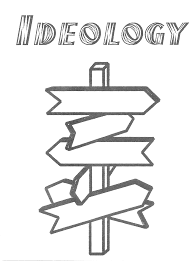记忆方法
为了记忆“ideology”这个单词,可以采用“易联想”法,将其分解为两部分:“idea”和“ology”。
1. “idea”代表“想法”或“观念”。
2. “ology”是许多名词后缀,表示“关于……的学科”或“论……的”。
结合这两部分,可以想象为“关于观念的学科”,即一种系统化的思想或信念体系。这样,你就可以将“ideology”记住为“意识形态”。
1. “idea”代表“想法”或“观念”。
2. “ology”是许多名词后缀,表示“关于……的学科”或“论……的”。
结合这两部分,可以想象为“关于观念的学科”,即一种系统化的思想或信念体系。这样,你就可以将“ideology”记住为“意识形态”。
以上内容由AI生成, 仅供参考和借鉴
中文词源
ideology 思想体系
来自idea,想象,想法,主意,-logy,学说。引申词义思想体系。
英语词源
- ideology
-
ideology: see idea
- ideology (n.)
- 1796, "science of ideas," originally "philosophy of the mind which derives knowledge from the senses" (as opposed to metaphysics), from French idéologie "study or science of ideas," coined by French philosopher Destutt de Tracy (1754-1836) from idéo- "of ideas," from Greek idea (see idea) + -logy. Later used in a sense "impractical theorizing" (1813). Meaning "systematic set of ideas, doctrines" first recorded 1909.
Ideology ... is usually taken to mean, a prescriptive doctrine that is not supported by rational argument. [D.D. Raphael, "Problems of Political Philosophy," 1970]
权威例句
- 1. To add spice to the debate, they disagreed about method and ideology.
- 他们在方法和观念上都持不同意见,这使辩论精彩了很多。
- 2. Such an approach accords with the principles of socialist ideology.
- 这种方法与社会主义意识形态的原则相符。
- 3. This encourages reductionist explanations of fascist ideology.
- 这助长了对法西斯意识形态的简单化解释。
- 4. Chomsky's review is entitled "Psychology and Ideology".
- 乔姆斯基的这篇评论题为《心理学与意识形态》。
- 5. The ideology has great influence in the world.
- 这种思想体系在世界上有很大的影响.
